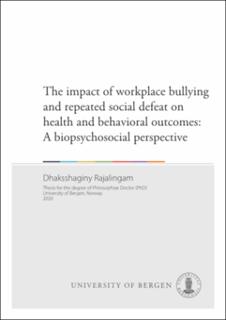The impact of workplace bullying and repeated social defeat on health and behavioral outcomes: A biopsychosocial perspective
Doctoral thesis
Permanent lenke
https://hdl.handle.net/11250/2719164Utgivelsesdato
2020-12-09Metadata
Vis full innførselSamlinger
Sammendrag
Workplace bullying is a severe problem that needs further investigation from a range of disciplines. Yet, during more than twenty years of research on workplace bullying, few studies have addressed the bullying phenomenon from a biological perspective. Hence, the purpose of this thesis was to learn more about how stressors such as workplace bullying in humans and repeated social defeat in rats affect the physiological and psychological mechanisms of the body, seeing the latter as an animal model of bullying among humans.
The purpose of this thesis was, therefore, to advance our understanding of how workplace bullying leads to severe health problems in those targeted. As such, the present research addresses individual susceptibility when exposed to workplace bullying and examines causative effects and mechanisms on the relationship between exposure to workplace bullying and subsequent health outcomes.
The first paper addressed the potential moderating effect of the miR-146a genotype on the association between exposure to workplace bullying and insomnia through psychological distress, using a nationally representative survey of Norwegian employees. The findings showed that the relationship between distress and insomnia induced by exposure to bullying was stronger among GG genotype individuals compared with GC/CC genotype individuals.
The second paper addressed the neuro-immune changes initiated by exposure to prolonged social stressors. Thus, an animal model of repeated social defeat – the resident-intruder paradigm – was implemented. The animal data demonstrated stress-induced health effects, including reduced weight gain, hypothalamic-pituitary-adrenal (HPA) axis changes, and an increased inflammatory profile of the isolated splenic myeloid cells.
The third paper addressed the changed expression of the β2-adrenergic receptor (ADRB2) during prolonged exposure to stressors and its role in the association between exposure to workplace bullying and anxiety. A moderating effect of the ADRB2 genotype on the workplace bullying-anxiety relationship in humans was also observed. Moreover, in vivo and in vitro experiments demonstrated reduced ADRB2 gene expression induced by the stress hormone norepinephrine (NE) and a stress-induced switch from an anti-inflammatory to a pro-inflammatory state of the immune cells.
In conclusion, the findings of the present thesis indicate that persistent social stressors in the form of workplace bullying may lead to subjective health complaints such as insomnia and anxiety by promoting a state of low-grade systemic inflammation. Also, the findings from the animal model of repeated social defeat suggest that the systemic inflammation may be a consequence of the missing functioning of the “breaks” of the sympathetic nervous system (SNS) and HPA axis. The persistent inflammatory state following exposure to persistent social stressors, causing excess production of pro-inflammatory cytokines, seems to cause dysregulation and mal-adaptation of biological mechanisms central in the stress response system leading to physiological and psychological changes that may be damaging for overall health and well-being. Thus, the present thesis demonstrates a clear link between exposure to persistent social stressors, genetic factors, and severe health problems in targets of bullying.
Består av
Paper I. Rajalingam, D., Jacobsen, D.P., Nielsen, M.B., Einarsen, S., & Gjerstad, J. (2019). Exposure to workplace bullying, distress, and insomnia: the moderating role of the miR-146a genotype. Frontiers in Psychology, 10, 1204. The article is available at: https://hdl.handle.net/1956/21426Paper II. Rajalingam, D., Nymoen, I., Jacobsen, D.P., Eriksen, M.B., Dissen, E., Nielsen, M.B., Einarsen, S., & Gjerstad, J. (2020). Repeated social defeat promotes persistent inflammatory changes in splenic myeloid cells; decreased expression of β-arrestin-2 (ARRB2) and increased expression of interleukin-6 (IL-6). BMC Neuroscience, 21, 25. The article is available in the thesis file. The article is also available at: https://doi.org/10.1186/s12868-020-00574-4
Paper III. Rajalingam, D., Nymoen, I., Nyberg, H., Dissen, E., Nielsen, M.B., Einarsen, S., & Gjerstad, J. (2020). Workplace bullying increases the risk of anxiety through a stress-induced β2-adrenergic receptor mechanism. The article is not available in BORA.
